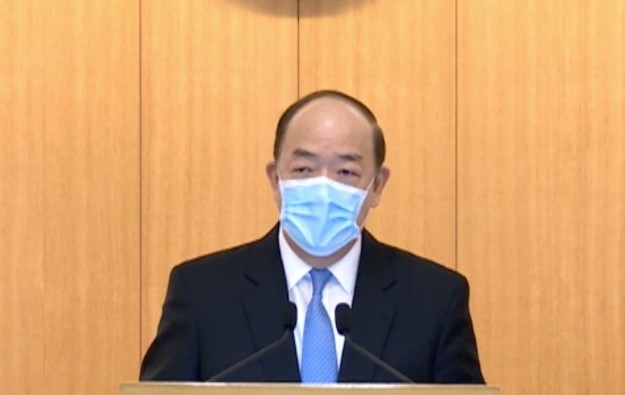Macau ups entry limits for China, HK, Taiwan visitors
Mar 24, 2020 Newsdesk Latest News, Macau, Top of the deck

Macau’s Chief Executive, Ho Iat Seng (pictured), announced on Tuesday a ban on entry to the city – from Wednesday and for an unspecified duration – for any would-be visitor from either mainland China, Hong Kong or Taiwan who has travelled overseas in the previous 14 days. The move is part of Macau’s effort to stem the spread of the Covid-19 disease.
Residents from either the mainland, Hong Kong or Taiwan who have been to any of the latter two places in the past two weeks will have to undergo a 14-day quarantine when arriving in Macau, Mr Ho said in a Tuesday press briefing.
Any person from mainland China who had not travelled abroad – or to Hong Kong or Taiwan - in the past two weeks would be allowed to enter Macau, but would have to undergo a medical examination at government-designated sites if they hail from a region that had recorded a high number of Covid-19 infections, the official added.
The tightened rules on who is allowed into Macau was announced as the city reported 15 new cases of Covid-19 infection, between March 15 and March 23. All of the new infections were imported cases, some involving non-resident workers returning to the city, and others involving Macau residents studying abroad.
Last week the Macau government had banned foreign visitors and non-resident workers registered in the city and hailing from an overseas country. Such bans did not cover people from mainland China, Hong Kong or Taiwan.
“The government assures all Macau citizens it will do a good job in epidemic prevention at any cost,” Mr Ho stated in Tuesday’s briefing.
The new measures were announced a day after Hong Kong said it would quarantine for 14 days all people entering that city starting on Thursday, in a bid to curb the spread of the novel coronavirus associated with the Covid-19 disease. Anyone arriving from mainland China, Macau or Taiwan will be allowed in, according to Hong Kong authorities, provided they had not travelled anywhere else in the past 14 days. They would however be subject to quarantine orders.
Social responsibility
Macau residents have for some time faced a compulsory 14-day quarantine when returning to the city. Initially home quarantine was possible for dwellings that met government guidelines. Since last week such quarantine must be at a government-sanctioned location. The government has so far designated eight local hotels as sites where people returning to the city must stay when undergoing the quarantine period.
In Tuesday’s briefing, Macau’s leader also called on Macau companies – particularly the city’s casino operators – to be more socially responsible. Mr Ho acknowledged that the government was “disappointed” in the response to its efforts to find suitable hotels to accommodate people undergoing the quarantine procedure.
The Chief Executive stated it would be “much easier” for the Macau government to accommodate these people in a “3,000-room hotel”, in order to centralise the government’s efforts in containing the spread of the Covid-19 virus. The government had said previously that it needed to choose carefully which hotels to use for quarantine purposes, highlighting that it would prefer standalone properties instead of large-scale casino resorts.
Mr Ho said that the government’s concern regarding the issue would not be directly reflected at the time of the refreshment process for gaming rights in the city, but he stated that the government did not rule out the possibility of adding in the new gaming contracts extra provisions regarding corporate social responsibility.
All the current casino licensees in Macau face the likelihood of a public retender process for gaming rights in the city linked to the expiry in June 2022 of the current permits.
Mr Ho said also that the government was confident of managing the downturn in casino gross gaming revenue (GGR) in Macau, and the corresponding decline in public income collected in gaming taxes.
The Macau government has halved its forecast for the city’s casino GGR in full-year 2020, due to the negative impact of the Covid-19 pandemic. Such forecast for this year is now MOP130 billion (US$16.3 billion), down from a projection of MOP260 billion, announced in November.
Related articles
-
 Sands China 2Q EBITDA down q-o-q amid...
Sands China 2Q EBITDA down q-o-q amid...Jul 25, 2024
-
 Nearly 60 people indicted in Macau for...
Nearly 60 people indicted in Macau for...Jul 19, 2024
More news
-
 Donaco EBITDA up y-o-y to above US$4mln...
Donaco EBITDA up y-o-y to above US$4mln...Jul 26, 2024
-
 HK listed Palasino upgrades Czech...
HK listed Palasino upgrades Czech...Jul 26, 2024
Latest News
Jul 26, 2024
Border-casino operator Donaco International Ltd has achieved a 164.17-percent year-on-year increase in its latest quarterly group earnings before interest, taxation, depreciation and amortisation...Sign up to our FREE Newsletter
 (Click here for more)
(Click here for more)
Pick of the Day
”We’ve got more traction outside of Macau at the moment. But Macau’s going be a bigger focus for us”
David Punter
Regional representative at Konami Australia
Most Popular
 Sheraton brand to exit Londoner Macao, to be Londoner Grand July 25, 2024
Sheraton brand to exit Londoner Macao, to be Londoner Grand July 25, 2024  Macau regulator probes unlicensed gaming agents July 24, 2024
Macau regulator probes unlicensed gaming agents July 24, 2024  Philippines gives 20k aliens in POGOs 60 days to leave July 25, 2024
Philippines gives 20k aliens in POGOs 60 days to leave July 25, 2024  Philippines-listed DigiPlus says not affected by POGO ban July 24, 2024
Philippines-listed DigiPlus says not affected by POGO ban July 24, 2024  Sands China 2Q EBITDA down q-o-q amid low hold, renovation July 25, 2024
Sands China 2Q EBITDA down q-o-q amid low hold, renovation July 25, 2024






